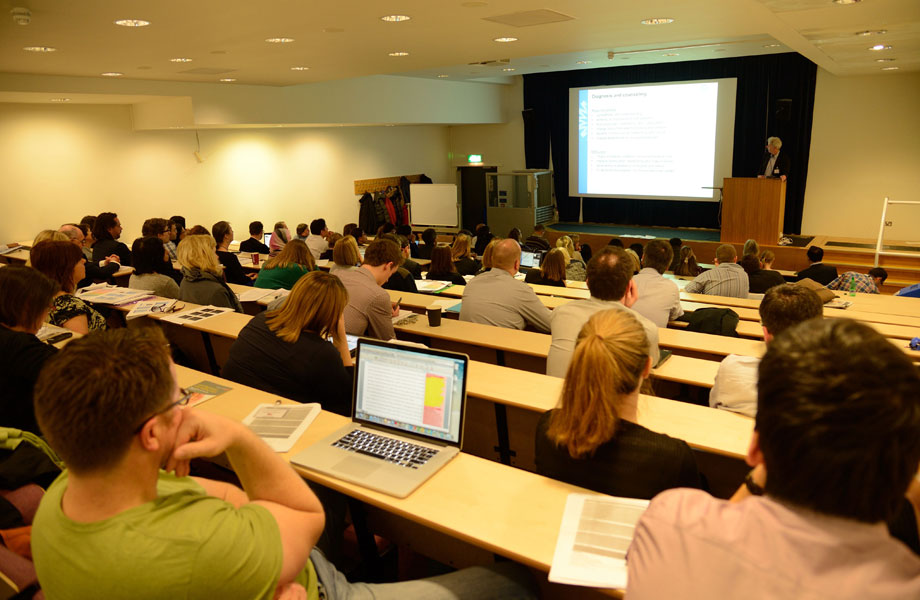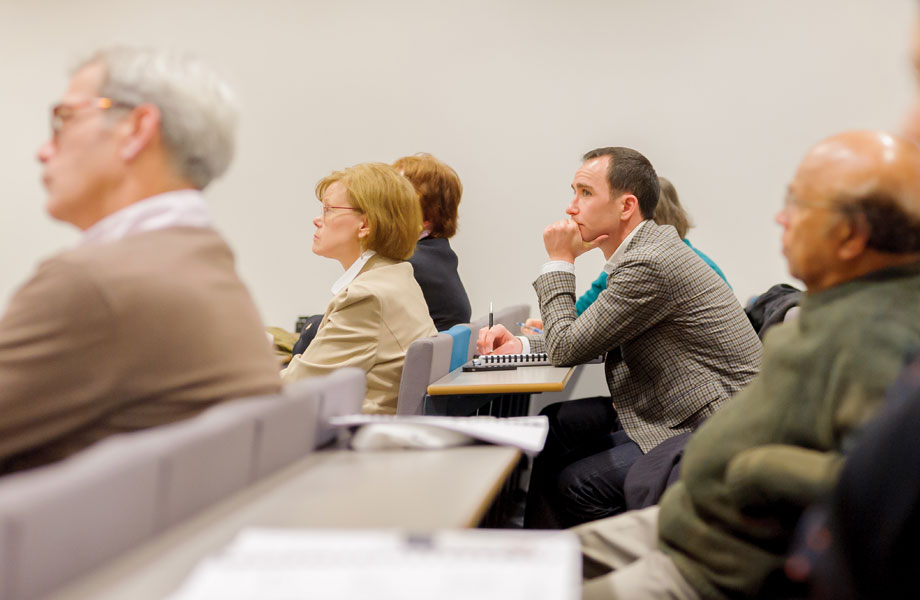Discourse on audiologist-delivered Cognitive Therapy
Discourse on audiologist-delivered Cognitive Therapy and professional boundaries

At present, there are no generally accepted “cures” for tinnitus or hyperacusis, so treatment is largely based on reducing the anxiety, discomfort and fear evoked by the tinnitus and/or hyperacusis. Cognitive behavioural therapy (CBT) is a psychological intervention that aims to alleviate anxiety by helping the patient to modify their unhelpful, erroneous cognitions and safety-seeking behaviours (Beck 1976; Clark et al. 1999). Two systematic reviews have led to the conclusion that CBT delivered by psychologists in a research setting helps patients to reduce the effect of tinnitus on their lives (Martinez-Devesa et al. 2010; Hesser et al. 2011). However, in the UK, 82% of tinnitus patients are referred to Audiology departments for treatment, either via their general practitioners or via Ear-Nose-Throat specialists (Gander et al. 2011). The referral pathway for hyperacusis patients is less understood but it is likely that they too are mainly referred to Audiology departments for treatment (Aazh et al. 2018; Aazh et al. 2014). As a result, in recent years audiologists in the UK and many other countries who are specialized in tinnitus and hyperacusis rehabilitation have increasingly been providing tinnitus and/or hyperacusis-specific CBT.

Although training in providing psychological interventions is not included in most audiology programs, the application of psychological interventions in the process of audiological rehabilitation has been recommended by many authors (English et al. 2000; Brooks & Johnson 1981; Aazh 2016; Aazh & Moore 2017a). The eminent psychologist Carl Rogers encouraged the use of psychological interventions by non-psychologists (Cain 1993). The acquisition of skill in using psychological interventions by non-psychologists in nursing, pharmacy and general medicine contexts has been studied by many authors (Burnard 1988; Burnard 1991; Corney 1993; Crawley 1990; Dryden 1985; Jacob 2000; Jeavons 1991; Keady & Williams 1998; Kokkinn & Stupans 2011; Maguire & Faulkner 1988). There is evidence suggesting that psychological interventions can be added to the training programs of non-psychologist health care professionals and that this has a positive on treatment outcomes (Kosowicz et al. 2007).
A recent study conducted in the National Health Service (NHS) in the UK showed that 65% of patients seen in an Audiology department for their tinnitus and/or hyperacusis met the criteria for being referred to mental health services, based on responses to at least one of several psychological questionnaires assessing generalized anxiety disorder, panic disorder, obsessive compulsive disorder, health anxiety, social phobia, and depression (Aazh & Moore 2017b). However, most patients who present with symptoms of anxiety and depression in addition to tinnitus and hyperacusis have already received treatment from their GP, typically by means of anti-anxiety and depression medications, prior to being referred to audiology. In addition, some patients may be reluctant to see a psychologist or psychiatrist, believing that their problems are to do with the auditory system rather than being psychological in nature. Of the patients who are referred to mental health services, many will, on further evaluation, not be considered as having a mental health problem that needs treating, but some will go on to receive treatment. There have been no studies examining whether such treatment helps with management of tinnitus and/or hyperacusis. The treatment outcomes are typically assessed based on changes in the underlying psychological illness, as opposed to changes in the deleterious effects of tinnitus and hyperacusis.

In addition to the lack of expertise in tinnitus and/or hyperacusis rehabilitation among mental health workers, another practical problem in referring all patients experiencing tinnitus and/or hyperacusis to mental health services is the long waiting times due to resource limitations and high demand, at least in the UK (Iacobucci 2014). Early intervention for tinnitus and/or hyperacusis management is needed, as 12.7% of patients who sought help for tinnitus and/or hyperacusis had suicidal and self-harm ideations and the incidence of these was correlated with their tinnitus and hyperacusis handicap (Aazh & Moore 2018c).
One solution to these problems is for psychological therapies to be delivered by audiologists rather than mental health specialists. There are several studies which shown promising results from audiologist-delivered CBT for tinnitus and hyperacusis (Beukes et al. 2017a; Beukes et al. 2017b; Aazh & Moore 2018b; Aazh & Moore 2018a). Audiologist-delivered CBT is focused on managing hyperacusis/tinnitus-related distress and patients with symptoms of co-morbid psychological disorders should be referred to mental health professionals for assessment and appropriate management of their psychological symptoms. These should be identified at the assessment stage prior to initiating the treatment. Patients should undergo psychiatric/psychological assessment/treatment at the same time or prior to their tinnitus and hyperacusis rehabilitation, when needed.
References
Aazh, H. (2016). Feasibility of conducting a randomised controlled trial to evaluate the effect of motivational interviewing on hearing-aid use Int J Audiol, 55, 149-156.
Aazh, H., Knipper, M., Danesh, A. A., et al. (2018). Insights from the third international conference on hyperacusis: causes, evaluation, diagnosis, and treatment. Noise Health, 20, 162-170.
Aazh, H., McFerran, D., Salvi, R., et al. (2014). Insights from the First International Conference on Hyperacusis: causes, evaluation, diagnosis and treatment. Noise Health, 16, 123-6.
Aazh, H., & Moore, B. C. J. (2017a). Audiological rehabilitation for facilitating hearing aid use: a review. J Am Acad Audiol, 28, 248-260.
Aazh, H., & Moore, B. C. J. (2017b). Usefulness of self-report questionnaires for psychological assessment of patients with tinnitus and hyperacusis and patients’ views of the questionnaires. International Journal of Audiology, 56, 489-498.
Aazh, H., & Moore, B. C. J. (2018a). Effectiveness of audiologist-delivered cognitive behavioral therapy for tinnitus and hyperacusis rehabilitation: outcomes for patients treated in routine practice American Journal of Audiolgy, [Epub ahead of print], 1-12.
Aazh, H., & Moore, B. C. J. (2018b). Proportion and characteristics of patients who were offered, enrolled in and completed audiologist-delivered cognitive behavioural therapy for tinnitus and hyperacusis rehabilitation in a specialist UK clinic. Int J Audiol, 1-11.
Aazh, H., & Moore, B. C. J. (2018c). Thoughts about suicide and self-harm in patients with tinnitus and hyperacusis. Journal of American Academy of Audiology, 29, 255-261.
Beck, A. T. (1976). Cognitive therapy and the emotional disorders. New York: International Universities Press.
Beukes, E. W., Allen, P. M., Manchaiah, V., et al. (2017a). Internet-Based Intervention for Tinnitus: Outcome of a Single-Group Open Trial. J Am Acad Audiol, 28, 340-351.
Beukes, E. W., Baguley, D. M., Allen, P. M., et al. (2017b). Audiologist-Guided Internet-Based Cognitive Behavior Therapy for Adults With Tinnitus in the United Kingdom: A Randomized Controlled Trial. Ear Hear
Brooks, D. N., & Johnson, D. I. (1981). Pre-issue assessment and counselling as a component of hearing-aid provision. Br J Audiol, 15, 13-9.
Burnard, P. (1988). Developing counselling skills in health visitors: an experimental approach. Health Visit, 61, 147-8.
Burnard, P. (1991). Acquiring minimal counselling skills. Nurs Stand, 5, 37-9.
Cain, D. J. (1993). The Uncertain Future of Client‐Centered Counseling. The Journal of Humanistic Education and Development, 31, 133-139.
Clark, D. A., Beck, A. T., & Alford, B. A. (1999). Scientific Foundations of Cognitive Theory
and Therapy of Depression. New York: Wiley.
Corney, R. (1993). The need for counselling skills in general practice. J R Soc Med, 86, 425-7.
Crawley, P. (1990). Counselling skills courses for nurses. Qld Nurse, 9, 20.
Dryden, W. (1985). Teaching counselling skills to non-psychologists. Br J Med Psychol, 58 ( Pt 3), 217-22.
English, K., Rojeski, T., & Branham, K. (2000). Acquiring counseling skills in mid-career: outcomes of a distance education course for practicing audiologists. J Am Acad Audiol, 11, 84-90.
Gander, P. E., Hoare, D. J., Collins, L., et al. (2011). Tinnitus referral pathways within the National Health Service in England: a survey of their perceived effectiveness among audiology staff. BMC Health Serv Res, 11, 162.
Hesser, H., Weise, C., Westin, V. Z., et al. (2011). A systematic review and meta-analysis of randomized controlled trials of cognitive-behavioral therapy for tinnitus distress. Clin Psychol Rev, 31, 545-53.
Iacobucci, G. (2014). UK government vows to monitor waiting times for mental health services in new strategy. Bmj, 348, g410.
Jacob, K. S. (2000). Basic counselling skills for medical practice. Natl Med J India, 13, 25-8.
Jeavons, B. (1991). Midwifery. Developing counselling skills. Nursing (Lond), 4, 28-9.
Keady, J., & Williams, K. (1998). Counselling skills for carers and early stage dementia care. Elder Care, 10, 15-7.
Kokkinn, B., & Stupans, I. (2011). Improving pharmacy counselling skills: an interdisciplinary model of support for students with English as an additional language. Int J Pharm Pract, 19, 435-7.
Kosowicz, L. Y., Pfeiffer, C. A., & Vargas, M. (2007). Long-term retention of smoking cessation counseling skills learned in the first year of medical school. J Gen Intern Med, 22, 1161-5.
Maguire, P., & Faulkner, A. (1988). Improve the counselling skills of doctors and nurses in cancer care. Bmj, 297, 847-9.
Martinez-Devesa, P., Perera, R., Theodoulou, M., et al. (2010). Cognitive behavioural therapy for tinnitus. Cochrane Database Syst Rev, Cd005233.
Read MoreCookie settings
REJECTACCEPT
Privacy Overview
| Cookie | Duration | Description |
|---|---|---|
| __stripe_mid | 1 year | Stripe sets this cookie cookie to process payments. |
| __stripe_sid | 30 minutes | Stripe sets this cookie cookie to process payments. |
| cookielawinfo-checkbox-advertisement | 1 year | Set by the GDPR Cookie Consent plugin, this cookie is used to record the user consent for the cookies in the "Advertisement" category . |
| cookielawinfo-checkbox-analytics | 11 months | This cookie is set by GDPR Cookie Consent plugin. The cookie is used to store the user consent for the cookies in the category "Analytics". |
| cookielawinfo-checkbox-functional | 11 months | The cookie is set by GDPR cookie consent to record the user consent for the cookies in the category "Functional". |
| cookielawinfo-checkbox-necessary | 11 months | This cookie is set by GDPR Cookie Consent plugin. The cookies is used to store the user consent for the cookies in the category "Necessary". |
| cookielawinfo-checkbox-others | 11 months | This cookie is set by GDPR Cookie Consent plugin. The cookie is used to store the user consent for the cookies in the category "Other. |
| cookielawinfo-checkbox-performance | 11 months | This cookie is set by GDPR Cookie Consent plugin. The cookie is used to store the user consent for the cookies in the category "Performance". |
| viewed_cookie_policy | 11 months | The cookie is set by the GDPR Cookie Consent plugin and is used to store whether or not user has consented to the use of cookies. It does not store any personal data. |
| Cookie | Duration | Description |
|---|---|---|
| _ga | 2 years | The _ga cookie, installed by Google Analytics, calculates visitor, session and campaign data and also keeps track of site usage for the site's analytics report. The cookie stores information anonymously and assigns a randomly generated number to recognize unique visitors. |
| _gat_gtag_UA_131443801_1 | 1 minute | Set by Google to distinguish users. |
| _gid | 1 day | Installed by Google Analytics, _gid cookie stores information on how visitors use a website, while also creating an analytics report of the website's performance. Some of the data that are collected include the number of visitors, their source, and the pages they visit anonymously. |
| CONSENT | 2 years | YouTube sets this cookie via embedded youtube-videos and registers anonymous statistical data. |
| Cookie | Duration | Description |
|---|---|---|
| VISITOR_INFO1_LIVE | 5 months 27 days | A cookie set by YouTube to measure bandwidth that determines whether the user gets the new or old player interface. |
| YSC | session | YSC cookie is set by Youtube and is used to track the views of embedded videos on Youtube pages. |
| yt-remote-connected-devices | never | YouTube sets this cookie to store the video preferences of the user using embedded YouTube video. |
| yt-remote-device-id | never | YouTube sets this cookie to store the video preferences of the user using embedded YouTube video. |
| yt.innertube::nextId | never | This cookie, set by YouTube, registers a unique ID to store data on what videos from YouTube the user has seen. |
| yt.innertube::requests | never | This cookie, set by YouTube, registers a unique ID to store data on what videos from YouTube the user has seen. |
| Cookie | Duration | Description |
|---|---|---|
| m | 2 years | No description available. |




